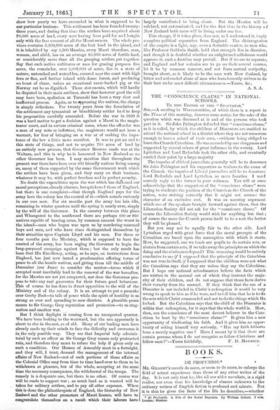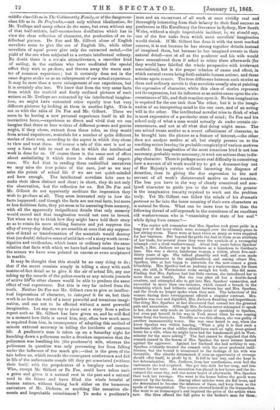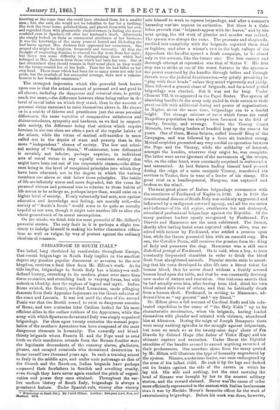BOOKS.
DE PROFUNDIS.* Mn. GILBERT'S novels do more, or seem to do more, to enlarge the field of actual experience than those of any other writer of the day. It is not only that he, like all our abler novelists, is a rigid realist, nor even that his knowledge of classes unknown to the ordinary writers of English fiction is profound and minute. But it is that he gives the facts of the life he describes,—whether • Do Pronouns. A Tale of the SWIM Deposits. By William Gilbert. 2 vols. London: &ashen. middle-class life as in The Goldsworthy Family, or of the dangerous- class life as in De Profandis,—not only without idealization, for Mr. Trollope and many others do the same, but even without any of that half-artistic, half-unconscious distillation which has in view the clear reflection of character, the production of an in- tellectual picture. De Foe and Mr. Gilbert alone of English novelists scorn to give the ore of English life, while other novelists of equal power give only the extracted metal,—the yield of the ore when subjected to a certain intellectual refinery. No doubt there is a certain attractiveness, a smoother kind of sailing, in the authors who have meditated the special effect they wish to produce, and thrown away the waste mat- ter of common experience ; but it certainly does not in the same degree strike us as an enlargement of our actual experience. It may be more than a mere enlargement of our experience, but it is certainly also less. We know that from the very same facts from which the truthful and finely outlined pictures of such writers as Mr. Trollope are extracted by his intellectual imagina- tion, we might have extracted other equally true but very different pictures by looking at them in another light. This is not so with the tales of De Foe and Mr. Gilbert. There we seem to be having a new personal experience itself in all its instructive force,—experience so direct and vivid that we can imagine that three or four writers of different powers and genius might, if they chose, extract from these tales, as they would from actual experience, materials for a number of quite different stories of their own, according to the aspect in which they chose to view and treat them. Of course a tale of this sort is not so easy a form of tale to read as that in which the intellectual work is done for us. Of course there is the same sort of effort about assimilating it which there is about. all real experi- ence. We feel that in reading these undistilled narratives we may miss the true points of the case, just as we may miss the points of actual life if we are not quick-minded and keen enough. The intellectual novelists take care to make their ideas distinct and clear ; in short, they do not only the observation, but the reflection for us. But De Foe and Mr. Gilbert do not apparently meditate the impression they wish to produce at all. They seem interested only in how the facts happened; and though the facts are not real facts, but more or less fictitious facts, they yet seem to be narrating from memory, with all the apparently insignificant details that only memory would record and that imagination would not care to invent. Yet when we try to think how they might have told their story so as to retain its more striking features and yet suppress the alloy of every-day detail, we are sensible at once that any suppres- sion of detail or transformation of the materials would destroy that (no doubt) delusive sense of solid fact —of 11 story worth inves- tigation and verification, which bears to ordinary tales the same relation that facts with which we have had actual contact bear to the scenes we have seen painted on canvas or even sculptured in marble.
It may- be thought that this should be an easy thing to do ; that if the secret consists simply in telling a story with such matter-of-fact detail as to give it the air of actual life, any one taking up the records of the police-courts or any minute journals of active Wein other classes would be able to produce the same effect of real experience. But this is very far indeed from the truth. Neither De Foe nor Mr. Gilbert care to give us intellec- tual impressions of character, to interpret it for us, but their work is no less the work of a most powerful and tenacious imagi- nation, and one not to be effected without a most powerful imagination. Let any one try to piece out a story from a police report such as Mr. Gilbert has here given us, and he will find in a moment how little is saved him, nay, often how much more is required from him, in consequence of adopting this method of minute external accuracy in telling the incidents of common life. A poulterer's man is taken up on a Saturday night for knocking down a policeman under a drunken impression that the policeman was insulting his (the poulterer's) wife, whereas the policeman in question was only preventing her from falling under the influence of too much gin ;—that is the germ of the tale before us, which records the consequent misfortunes and fall in life of the unfortunate couple till they get associated (without their fault) with the perpetrators of a burglary and murder. Who, except Mr. Gilbert or De Foe, could have taken such a germ and given it a natural root in the past and a natural seed in the future and have filled the whole brimful of human nature, without falling back either on the humorous caricature of Mr. Dickens, or anything like sensation ele- ments and improbable coincidences ? To make a poulterer's man and an ex-servant of all work at once vividly real and thoroughly interesting from their infancy to their final success as poulterers to His Excellency the Governor in Sydney, New South Wale!, without a single improbable incident, is, we should say, one of the few tasks from which most novelists' imagination would shrink. If Mr. Gilbert has done it with the most marked success, it is not because he has strung together details instead of imagined them, but because he has imagined events in their natural detail—not at all as the poulterer and his wife would have remembered them if asked to relate them afterwards (for they would have falsified the whole perspective with irrelevant associations), but in the proper relation of cause and effect, in which natural events bring forth suitable human actions, and these actions again events. The true difference between such stories as these and ordinary novels is that novelists usually aim at painting the expression of character, while this class of stories represent not its expression, but its influence as an active cause upon the cir- cumstances of life, and their reaction upon it. No less imagination is required for the one task than *the other, but it is the imagi- nation of an interpreting mind in the one case, and of an acting will in the other. The intellectual novelist tries to think of what is most expressive of a particular state of mind ; De Foe and his school only of what a man would actually do under certain cir- cumstances, and not at all what that doing might mean. The one school treats motive as a secret co'nstituent of character, to be brought into the picture as a feature of interest,—the other does not analyze motive at all, but simply presses on to the resulting action leaving its probable complexity of various motives unsifted. But imagination of the most tenacious kind is not less necessary, probably more necessary, to work out actions than to dis- play character. There is perhaps more real difficulty in conceiving how a servant of all work would try to get a drummer-boy out of Her Majesty's service without incurring the disgrace of desertion, than in giving the due expression to the said servant of all work's disinterested motive on that occasion. The less you have in the way of clearly conceived and ana- lyzed character to guide you to the true result, the greater is the imaginative tenacity required to work out the problem truly. Yet Mr. Gilbert can follow the minds of his dramatis persona as far into the inner meaning of their own characters as is natural for them. What can be more true to life than the following thread of self-reproach in the conscience of an excellent old washerwoman who is "examining the state of her soul" while dying from cancer?—
" The reader will remember that Mrs. Sparkes took great pride in a long row of flat irons which were arranged over the chimney-piece in her sitting-room. These were at least twice as many as were required for her business. But beyond the pride she had in them as an attribute of her trade, for several years they were the symbols of a revengeful triumph over a rival washerwoman. About four years before Sparkes' death, a Mrs. Jackson set up in business as a laundress in Gardner's lane. She was a showy, handsome woman, a widow, about five-and- thirty years of age. She talked plausibly and well, and soon made many acquaintances in the neighbourhood, and among others Mrs. Sparkes, who at last began to entertain for the new-comer a great friendship. Mrs. Sparkes had no jealousy as a washerwoman, for there was, she said, in Westminster room enough for both. She did more. Finding that Mrs. Jackson had but little custom, she introduced her to more than one family. But she was after all but a double-faced creature, and attempted also to get into Mrs. Sparkes' connection, and succeeded in more than one instance, which caused a breach in the friendship which had hitherto existed between her and Mrs. Sparkes, and the rivals no longer spoke when they met. The behaviour of the women during their estrangement offered a singular contrast. Mrs. Sparkes was cool and dignified, Mrs. Jackson flaunting and impertinent. One thing Mrs. Sparkes at last discovered that caused her the greatest pain and uneasiness. Although Mrs. Jackson never attempted to speak to her, she not only made an invariable point of speaking to Sparkes, but even put herself in his way in York street when he was coming home from the barracks. Terrible as was this offence, she was guilty of another immeasurably worse. She was once heard to say, when she knew Sparkes was within hearing, 'What a pity it is that such a handsome fellow as that soldier should have such an ugly, cross-gained brute for a wife, when he might have had the handsomest girl in West- minster for the mere asking !' The fact cannot be disguised that this remark caused in the bosom of Mrs. Sparkes the most intense hatred against the aggressor. Against her husband she had nothing to say. Sparkes evidently treated the remark with the most profound indif- ference, but the wound it occasioned to the feelings of his wife was incurable. She silently determined, if ever an opportunity of revenge should offer itself, to profit by it. It fell in her way, and she kept to her determination. Mrs. Jackson, from her carelessness, soon lost the customers she had acquired. She got into debt for her soap, and into arrears for her rent. An execution was placed in her house and she de- camped the same day, and was never heard of afterwards. Mrs. Sparkes then took her revenge. She went to the house before the goods were removed by the broker. Among other articles were six flat irons, and she determined to become the Mistress of these, and keep them as the spoils of the vanquished. The woman showed herself in the transaction. She went to an ironmonger's and inquired the price of the article when new. She then offered the full price to the broker's man for them, knowing at the same time she could have obtained them for a smaller gum; but, she said, she would not be beholden to her for a farthing. She took the irons home, polished them, and placed them with her own, and regarded them with pleasurable vindictiveness (a feeling she never confided even to Sparkes) till after her husband's death. Afterwards she simply looked on them as ornamental attributes of her business. It was the knowledge of the many years of hatred and ill-feeling she had borne against Mrs. Jackson that oppressed her conscience. She prayed she might be forgiven, frequently and fervently. At first she thought of requesting Jemima to conceal the fist irons from her sight ; but there was some difficulty in distinguishing those which had belonged to Mrs. Jackson from those which had been her owns She at last determined they should remain in their usual place as they would for the future remind her of her fault. Thus her sin hId fallen on her own head. Those irons which had been for so many years not only her pride, but the symbols of her successful revenge, were now a remem- brancer to her wounded conscience."
The strongest impression which this powerful book leaves upon one is that the actual amount of personal evil and good in all classes, including the dangerous and criminal class, is pretty much the same,—the difference between them being rather in the level of moral habit on which they stand, than in the amount of personal virtue exercised to raise themselves above it. He shows us in a society of thieves and prostitutes just the same personal difference, the same varieties of comparative selfishness and disinterestedness, sympathy and hardness, as we find in respect- able society, the difference being that actions which require heroism in the one class are often a part of the regular habits of
the others, while the virtue of mutual self-sacrifice is more called out in the depths of want and poverty than in the more " independent " classes of society. The low and crimi- nal society of "Smith's Rents," Westminster, here delineated is certainly not inferior, perhaps superior, in individual acts of moral virtue to any equally numerous society that might have been cut out of the respectable classes,—the differ- ence being in the level of recognized principles into which they have been educated, not in the degree in which the various members rise above or sink below these principles. The habits of life are infinitely worse and more degraded, but the room for personal virtues and personal sins in relation to those habits of life seems to be as large as, perhaps larger than, would exist on a higher level of society. If only voluntarily bad acts, acts against education and knowledge and feeling, are morally evil,—the society of "Smith's Rents" would seem to be quite as morally hopeful as our own, though it might take another life to alter the whole groundwork of its moral assumptions.
On the whole, we think this the most powerful of Mr. Gilbert's powerful stories. The only fault in it is perhaps a slight ten- dency to indulge himself in making his better characters ridicu- lous as well as vulgar, by way of protest against the ordinary idealism of romance.
































 Previous page
Previous page